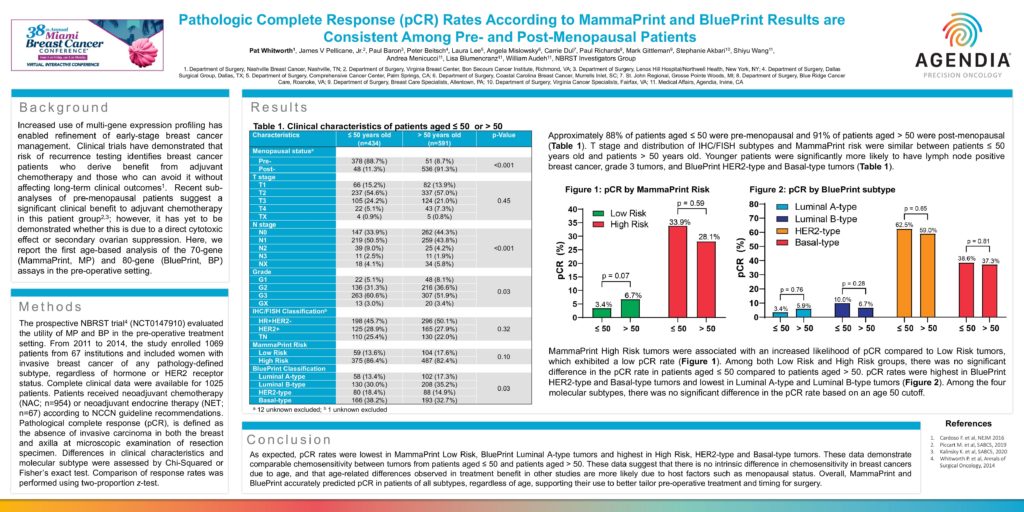Publication: Miami Breast
Authors
Pat Whitworth, James V Pellicane, Jr., Paul Baron, Peter Beitsch, Laura Lee, Angela Mislowsky, Carrie Dul, Paul Richards, Mark Gittleman, Stephanie Akbari, Shiyu Wang, Andrea Menicucci, Lisa Blumencranz, William Audeh, NBRST Investigators Group.
Background
Increased use of multi-gene expression profiling has enabled refinement of early-stage breast cancer management. Clinical trials have demonstrated that risk of recurrence testing identifies breast cancer patients who derive benefit from adjuvant chemotherapy and those who can avoid it without affecting long-term clinical outcomes1. Recent sub-analyses of pre-menopausal patients suggest a significant clinical benefit to adjuvant chemotherapy in this patient group2,3; however, it has yet to be demonstrated whether this is due to a direct cytotoxic effect or secondary ovarian suppression. Here, we report the first age-based analysis of the 70-gene (MammaPrint, MP) and 80-gene (BluePrint, BP) assays in the pre-operative setting
Results
Approximately 88% of patients aged ≤ 50 were pre-menopausal and 91% of patients aged > 50 were post-menopausal (Table 1). T stage and distribution of IHC/FISH subtypes and MammaPrint risk were similar between patients ≤ 50 years old and patients > 50 years old. Younger patients were significantly more likely to have lymph node positive breast cancer, grade 3 tumors, and BluePrint HER2-type and Basal-type tumors (Table 1).
Conclusion
As expected, pCR rates were lowest in MammaPrint Low Risk, BluePrint Luminal A-type tumors and highest in High Risk, HER2-type and Basal-type tumors. These data demonstrate comparable chemosensitivity between tumors from patients aged ≤ 50 and patients aged > 50. These data suggest that there is no intrinsic difference in chemosensitivity in breast cancers due to age, and that age-related differences observed in treatment benefit in other studies are more likely due to host factors such as menopausal status. Overall, MammaPrint and BluePrint accurately predicted pCR in patients of all subtypes, regardless of age, supporting their use to better tailor pre-operative treatment and timing for surgery.
Media Contact
Terri Clevenger
Westwicke/ICR Healthcare PR
Tel: 203.856.4326
Terri.Clevenger@icrinc.com


